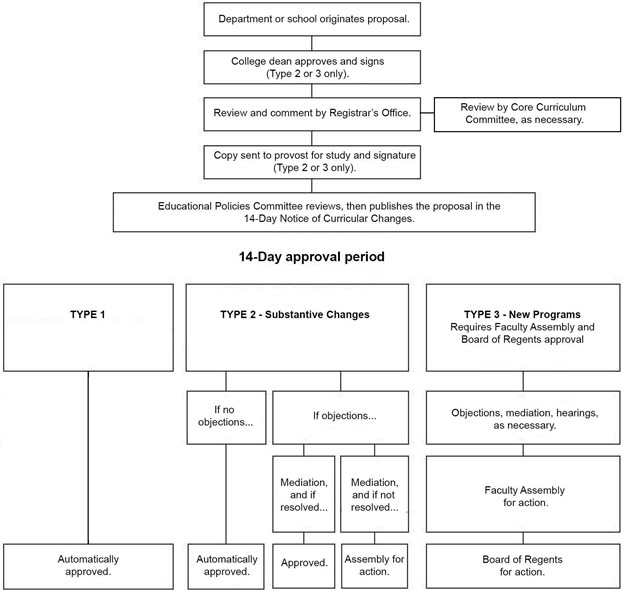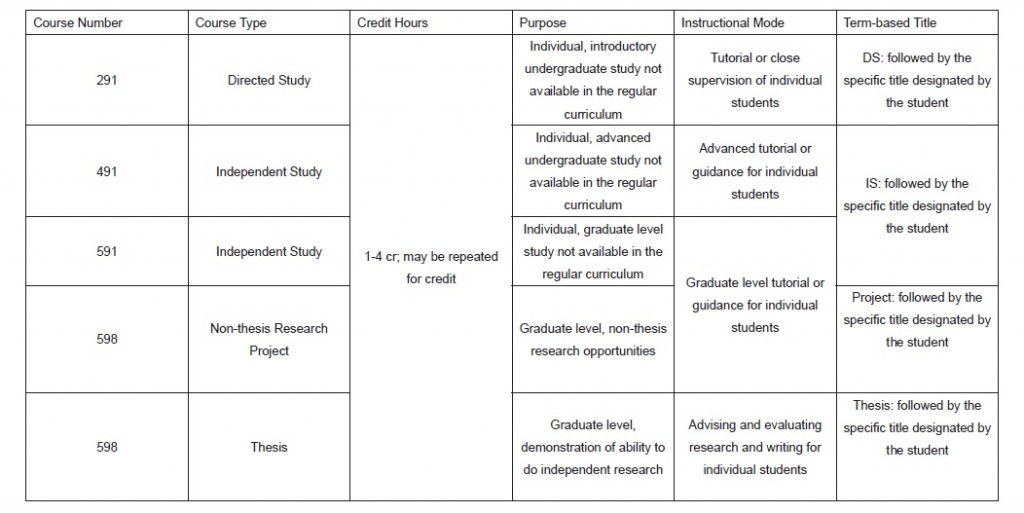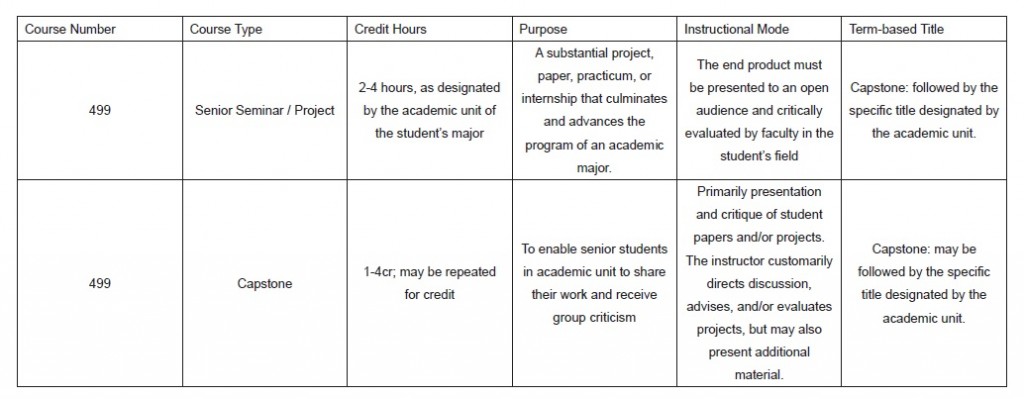TABLE OF CONTENTS
Section 1. Faculty Approval of Curriculum and Degree Requirements
Section 2. Flowchart of Usual Procedure for Curriculum Revision
Section 3. Procedures Governing Revision of Curriculum and Degree Requirements
Section 4. Format for Preparing Proposals
Section 5. Policies for Open Topic Courses
Section 6. Catalogs and Class Schedules
Section 1. FACULTY APPROVAL OF CURRICULUM AND DEGREE REQUIREMENTS
- All curricula and degree requirements shall be approved by the faculty [Faculty Constitution, Article III, Section 2.B.6].
- “Curricula” includes all courses, workshops, and continuing education offered for credit at Pacific Lutheran University.
- “Degree requirements” includes all undergraduate and graduate requirements of a department, school or college for successful completion of its program(s). (Examples of such requirements include: prerequisites; the number of courses or credit hours required for a major or minor; area examinations, research, or thesis; recitals, exhibitions, or contests; courses to be taken in other departments; internships; etc.)
- All faculty legislation substantively affecting core curriculum elements or degree requirement shall carry with it an effective date.
- All curricular changes, except special topics courses that do not meet a core curriculum element, shall be placed on the EPC 14-Day Notice of Curriculum Changes and receive faculty approval before being listed in the university catalog by the Office of the Registrar, or on the PLU website. Specific topics for special courses are not listed in the university catalog.
- EPC categorizes proposed curricular changes into three different types of proposals: Type 1, Type 2 (substantive changes), and Type 3 (new programs). An overview of the process for each type of proposal is detailed in Section 2. of this manual. Forms and templates for EPC proposals can be found on the Documents and Forms page of the Provost website (https://www.plu.edu/provost/documents/).
- Special Topics courses that seek to carry a core curriculum designation, must be approved through EPC Proposal Form before being offered. A Special Topics course without a core curriculum element, must provide the course title, number, course description, and credit hours in the schedule template to the registrar’s office before inclusion in the class schedule.
- The same Special Topics course may only be offered three times after which the course must be reviewed by the Educational Policies Committee following the normal approval process for permanent course status.
Section 2. FLOWCHART OF USUAL PROCEDURE FOR CURRICULUM REVISION

Section 3. PROCEDURES GOVERNING REVISION OF CURRICULUM AND DEGREE REQUIREMENTS
- Each proposed change in curriculum and in degree requirements shall be discussed and approved by the academic unit of origin. The academic unit head shall sign the proposal—indicating whether two-thirds of the faculty has approved the proposal or not—and submit it, where appropriate, to the college dean.
- Approval by the college dean shall be given in accordance with established procedures of the respective college. The college dean shall sign the proposal as evidence of such approval. The academic unit originating the proposal shall forward one copy with the required signatures to the provost for signature, along with an electronic copy of the proposal.
- If a proposal affects staffing or enrollments outside of the unit that is originating the proposal, approvals must be sought before submitting to EPC, as indicated by an email or the signature of the relevant academic unit head. If a proposal comes to EPC without such an endorsement, EPC can review it but will hold approval until endorsements are received.
- The registrar and provost shall relay the proposal with appropriate comment to EPC for its review. Proposals for new degrees, new majors, new minors, concentrations, and programs that require action by the Board of Regents require submission of an Institutional Impact Evaluation Form. In addition, EPC shall present such proposals to the faculty, which will decide whether to recommend them to the Board of Regents.
- Descriptions of proposed substantive curricular changes and new programs shall be published by EPC in the 14-Day Notice of Curriculum Changes and sent via email to all faculty members. Complete copies of proposals may be requested by email via facgov@plu.edu.
- Faculty members must submit objections to proposals in writing to the Chair of EPC via facgov@plu.edu within 14 days from the date listed on the 14-Day Notice of Curriculum Changes distributed by EPC. Objections received within this 14-Day period will suspend approval, pending resolution of the objections. In the event a dispute cannot be resolved, EPC will make its recommendation to the faculty for action at the next regular faculty meeting.
Section 4. FORMAT FOR PREPARING PROPOSALS
- Proposals require a completed current EPC Proposal Form and any supporting documents listed on the form. Forms and templates for proposals can be found on the Documents & Forms page of the Provost website (https://www.plu.edu/provost/documents/file-group/epc-information/).
- Proposal rationales should discuss the philosophic, strategic, demographic, and economic aspects of the proposed changes, and take into account comparable practices at other peer institutions and those suggested by national, regional, and state certifying bodies. Type 3 proposals must also address, using verifiable data and sound argumentation, the direct and indirect consequences and costs of the changes on staffing and enrollment in departments, schools, colleges, and the university.
- EPC may, at its discretion, determine whether a proposed change is substantive or non-substantive. If a determination is made that the proposal is indeed a substantive change, it may be sent back to the originating unit for additional detail. Minor corrections of language, grammar, or typographical errors may be requested directly by memo to the registrar and do not require EPC approval.
- Activation of special topics courses that are not intended to meet a general education element do not require EPC action. (However, the course number, title, credit value, and catalog description of such courses must still be included in the scheduling template for the Office of the Registrar before a Special Topics course is included in the class schedule.) Special Topics courses that are intended to meet a general education element require approval by the Core Curriculum Committee, received through the EPC proposal process.
Section 5. POLICIES FOR OPEN TOPIC COURSES
- INDEPENDENT STUDY COURSES: Academic units may add any of the following courses designed for individual students to the curriculum without approval by EPC.
Note: When an instructor agrees to offer a course available in the regular curriculum to a student on an individual basis, the regular course number, title, and credits must be used. The common title designation on term-based records will be listed as IS for independently studied.

B. INTERNSHIPS: Academic units may add any of the following internship courses to the curriculum without approval by EPC. Academic units that offer more than one internship should use the numbering designation below and distinguish different internships by means of the specific Term-based Title.

C. COURSES THAT FULFILL THE CULMINATING EXPERIENCE CORE CURRICULUM ELEMENT

D. SPECIAL TOPICS COURSES: Academic units may activate any of the Special Topic courses listed below to the curriculum as described above in sections 1.B.2.

Section 6. CATALOGS AND CLASS SCHEDULES
With the exception of Open Topics courses listed in Section 5, all catalogs and class schedules shall include only those courses that have been formally approved by EPC. Course numbers, titles, descriptions, credit hours, and status shall be shown only in their EPC-approved form. (Course titles may be appropriately abbreviated, where necessary.)
Only EPC shall authorize material changes in the university’s curricula and course offerings.
Courses which have not been taught (even though they may have been offered) during the previous four-year period shall be automatically deleted from the list of EPC-approved courses after notification to the affected units and, therefore, from all catalogs and class schedules. Requests for exceptions to this policy shall be submitted to EPC. Reactivation of formerly offered courses may be requested by way of a Type 1 proposal to EPC via facgov@plu.edu.
Previously used course numbers and course information are eliminated from Banner and can be reused once a course has not been offered in the catalog for more than twenty years.


